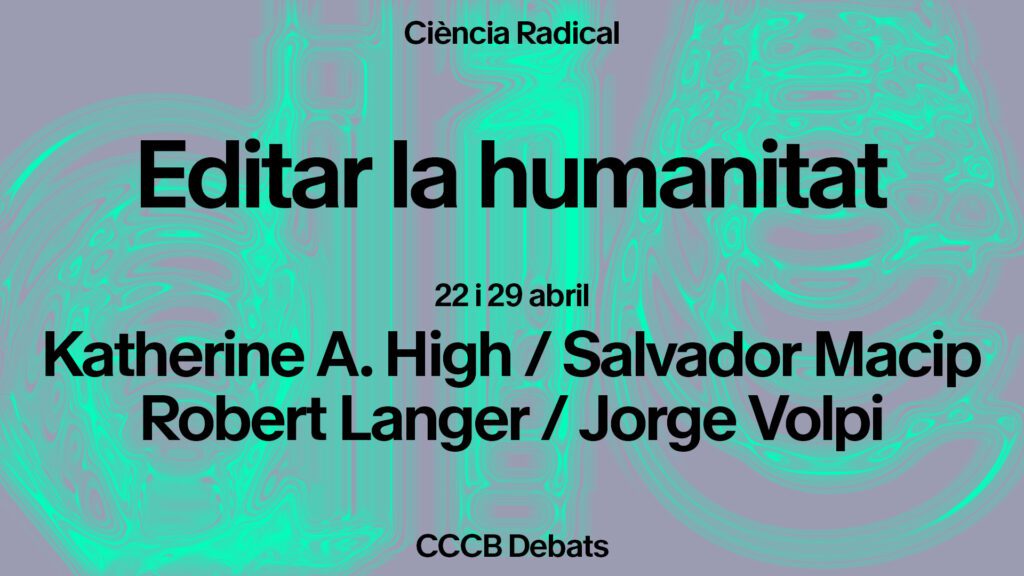IBEC is one of four Catalan research centres collaborating with the Centre de Cultura Contemporània de Barcelona (CCCB) on the ‘Radical Science’ project. This cultural project, which will be launched on 20 January 2025, aims to explore how scientific research is changing the world today. Renowned researchers and artists invite us to reflect on scientific advances in biotechnology, quantum physics and the exploration of the universe.

The Institute for Bioengineering of Catalonia (IBEC), together with three other leading research centres in Catalonia – the Institute of Photonic Sciences (ICFO), the Institute of High Energy Physics (IFAE) and the ALBA synchrotron – will inaugurate the Radical Science programme on 20 January, in collaboration with the Centre de Cultura Contemporània de Barcelona (CCCB).
Specifically, Radical Science is the result of collaboration between the four Complementary Plans led by Catalonia, including the IBEC-led Complementary Plan for Biotechnology Applied to Health. This project marks a milestone in the collaboration between science, the humanities and the arts, while highlighting Catalonia’s key role in the most advanced scientific projects in science and technology in Spain, framed within these Complementary Plans.
On 20 January 2025, Radical Science will launch with a round table that will bring together the directors of these four Catalan research centres: Josep Samitier (IBEC), Lluís Torner (ICFO), Caterina Biscari (ALBA Synchrotron) and Eugenio Coccia (IFAE). Together, they will reflect on the cutting-edge research that Catalonia is leading and analyse the most innovative initiatives in fields such as quantum communication, energy transition, personalised medicine and the study of the universe. The event, moderated by science communicator Toni Pou, will open with the screening of Superradiance, an audiovisual proposal by Memo Akten and Katie Peyton Hofstadter that combines artificial intelligence, dance and neuroscience.
The Radical Science programme offers a diverse agenda that addresses fundamental issues in contemporary science from a holistic perspective. A total of four key debates have been organised, bringing together humanists and scientists to address the ethical, social and technological challenges posed by new technologies.

As part of the IBEC programme, the dialogue “Editing Humanity: Genetic Engineering and Personalised Medicine”, which will focus on the ethical and technical limits of biomedicine, will take place on 22 and 29 April:
– On 22 April, physician-scientist Katherine A. High and researcher Salvador Macip will discuss genetic engineering and personalised medicine.
– On 29 April, MIT’s Robert Langer and writer Jorge Volpi, author of La invención de todas las cosas, will discuss the impact of genetic engineering on our lives in the coming years.
In addition to these scientific debates, the Radical Science programme will include a series of artistic residencies for poets and artists at the participating research centres, as well as a visual and performing arts section. These meetings and activities aim to open up new perspectives on the challenges of the 21st century and to foster a dialogue between science and the arts. The programme will also provide a space for secondary school students to interact directly with leading scientists, such as Ignacio Cirac and Nathalie Cabrol, in order to inspire new generations in the field of science.
Radical Science is a major cultural programme about the research that will change the world as we know it, and a commitment by the Complementary Plans to promote effective access and full participation by society in scientific culture.
For more information about the programme and to register for the activities, please visit the official website of the CCCB: https://www.cccb.org/en/activities/file/pioneering-science-in-catalonia/246632
This project, integrated in the framework of PERTE for Vanguard Health, has been co-financed by the Ministry of Science, Innovation and Universities with funds from the European Union NextGenerationEU, from the Recovery, Transformation and Resilience Plan (PRTR-C17.I1) and by the Autonomous Community of Catalonia through ICFO, the ALBA Synchrotron, IBEC and IFAE.





